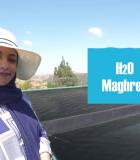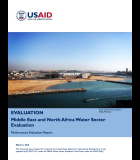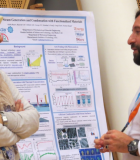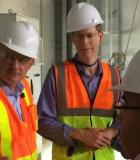Further Advancing the Blue Revolution Initiative (FABRI)
The regional water problems in MENA countries are rather universal, vary in intensity and impact, but share common problems in water scarcity, poor investment in water services to the poor, and limited coverage in water supply and sanitation. The priority challenge in this region is to extend basic water services to the millions of households, especially in the rural areas. MENA countries have expanded water supply to most citizens, and allocated substantial investment in the sector which is under risks because of increasing variability and scarcity of water supplies. In most countries, there is no room for expansion of traditional water resources which in most cases have already been committed. Risky and expensive investment is now needed to develop non-conventional water resources including desalination, deep water aquifers, and wastewater treatment.
The Further Advancing the Blue Revolution Initiative (FABRI)—implemented by DAI—worked closely with USAID to launch and strengthen the Middle East and North Africa Network of Water Centers of Excellence (MENA NWC), a regional association of research and educational institutions. Collaborating on applied research with governments, businesses, and civil society organizations, MENA NWC is addressing shared challenges in the water sector using locally appropriate scientific, technological, and management solutions. The value added of this Network is to synthesize and share regional knowledge and experiences about these issues to guide investment and enhance the efficient management and equitable allocation of water resources through responsive water policies and pricing.
In Africa, FABRI joined with the African Water Association (AfWA) in an ambitious first continent-wide program to halt the constant creep of higher water-loss levels. FABRI and AfWA are working with 19 national and city water companies and state water boards in 16 countries to improve financial, economic, and operating efficiency, including development of association business plans, non-revenue water initiatives, capacity building, and communications and knowledge sharing programs.
Activity Description
The Network implemented the above themes through:
- Regional programs for policy dialogue among policy makers and practitioners to better understand the interplay between water security, food security and energy. This program would be implemented through cooperation among select number of participating centers with the support of interested regional and international organizations and governments in the region.
- Prepare regional programs for capacity building designed to address the needs of different players in the water sector: Water practitioners and service providers, local communities, local government and municipalities and civil society engaged in the water sector, policy makers and planners, and young scientists and researchers engaged in field studies related to water management and services.
- Design regional research and knowledge generation network to update information and data about major themes affecting the region. This effort should be accompanied by national level information and knowledge profile about the above themes to inform policy makers and donors about current conditions and future challenges where action is needed.
- Regular contact with bilateral and international donors and development agencies to exchange information and build cooperative programs for advancing scientific knowledge ad informed policy planning to manage the risks and the volatility of the water sector under increasing scarcity and diminishing water security for the growing population in the MENA region.
Expected Outcomes
- Establish an operational Middle East and North Africa Network of Centers of Excellence (MENA NWC)
- Strengthen Integrated Water Resources Management Programming.
- Access to Clean Water and Sanitation Improved in Target African and Middle Eastern Countries
- Strengthen Research and Development Capacities in Irrigation, Groundwater Management, and Drought Risk Assessment and Mitigation
- Strengthen Transboundary Water Cooperation in Key River Basins
- Enhance Technical and Outreach Capacity of USAID Staff in Water and Sanitation Programming
Actual Outcomes
- In June 2009, President Obama committed the United States to improving the quality of science and technology in the Muslim World. Further Advancing the Blue Revolution Initiative (FABRI), supported by USAID, fulfilled that commitment by designing, registering, and strengthening a regional water platform in the Middle East that focused on addressing and resolving longstanding water issues through policy, research, and development. Of the roughly half dozen international S&T centers that the U.S. government considered, only the Middle East and North Africa Network of Water Centers of Excellence (MENA NWC) came to fruition.
- The Network is registered in both the U.S. and Jordan as an international organization, has a recognized governance structure, is implemented by a highly qualified staff of Middle East experts, and has a history of running a rich and varied research program with three grants. The long-term sustainability of MENA NWC would be a notable achievement, given the Middle East’s poor track record in establishing and supporting regional entities, particularly in the water sector.
- As part of the institutionalization process, with the help of a Washington-based attorney experienced with the non-governmental organization registration process, FABRI successfully registered MENA NWC with the Internal Revenue Service as a 501(c) entity for tax-exempt contributions. FABRI prepared and secured Founders Committee approval of Articles of Association and By-laws, both required for registration.
- In all, 23 national, regional, and international research entities joined the Network as members.
- FABRI held many workshops for Center staff to strengthen their research problem conceptualization and proposal writing skills. Over the first two years of the project, there was a demonstrable improvement in the ability of Center scientists to define and develop proposals. Center scientists also improved and expanded their technical skills by working with U.S. partners and other Centers with special expertise.





